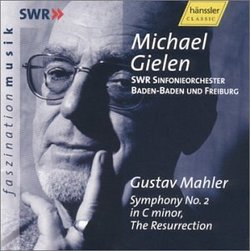| All Artists: Arnold Schoenberg, Michael Gielen, SWR Sinfonieorchester, Gyorgy Kurtag Title: Mahler: Symphony No. 2 in C minor, The Resurrection / Gielen, SWR Sinfonieorchester Members Wishing: 0 Total Copies: 0 Label: Hanssler Classics Original Release Date: 1/1/2000 Re-Release Date: 9/26/2000 Genre: Classical Styles: Opera & Classical Vocal, Historical Periods, Modern, 20th, & 21st Century, Symphonies Number of Discs: 2 SwapaCD Credits: 2 UPCs: 040888300120, 4010276010920 |
Search - Arnold Schoenberg, Michael Gielen, SWR Sinfonieorchester :: Mahler: Symphony No. 2 in C minor, The Resurrection / Gielen, SWR Sinfonieorchester
 | Arnold Schoenberg, Michael Gielen, SWR Sinfonieorchester Mahler: Symphony No. 2 in C minor, The Resurrection / Gielen, SWR Sinfonieorchester Genre: Classical
|
Larger Image |
CD Details |
CD ReviewsUnusual fillers with a warhorse Bruce Hodges | New York, NY | 07/29/2004 (5 out of 5 stars) "To tell the truth, I have five or six recordings of this Mahler and hardly needed another, but Gielen's came out shortly around the time I heard one of its fillers, performed live. Kurtag's Stele is an amazing work, a 15-minute funeral ode, and I've heard few pieces like it. Its central section is a series of dense, softly pulsating chords that seem composed from another world. (Sometime I'd like to see the score.) The Mahler is terrific -- one of the best versions around, and there are lots of them. Gielen seems to have spot-on instincts for choosing just the right tempi, bringing out all the inherent drama. The SWR musicians sound terrific, considering that this is an ensemble not everyone might view as a first choice. Never mind. If you've never heard of them (and actually I hadn't), don't let that sway you -- they play magnificently. The Schoenberg is also valuable, and equally well-performed, even though I confess I'm not the biggest fan of the work's mix of music and narration. (When I'm in the mood for music, speech competes with the other side of the brain, and for the same reason, Copland's Lincoln Portrait doesn't really work for me, either.) But again, the performance is excellent and this particular Schoenberg isn't done that often. Haenssler's sound is wonderful -- clear and with plenty of space (as it must be) to capture the enormous climaxes that are everywhere in these pieces. If you are at all intrigued by the accompaniments to the Mahler, this is an outstanding program." Wow! Lots of character! Gregory M. Zinkl | Chicago, IL | 01/19/2001 (5 out of 5 stars) "My shelves are, for me, overflowing with Mahler 2nds. Slatkin, Scherchen, Litton, Walter are all there, and now Gielen joins them.It's hard to choose between Scherchen, who is sometimes downright weird in his tempo shifts, or Gielen. They have very characterful interpretations, with tempo changes that I've not heard before. They both bring out details--Scherchen is especially good at one really terrific moment in I, where the strings use the wood of their bows (I kind of a percussion sound) to add to the excitement; Slatkin's was pretty good too, but Scherchen is downright gripping. Slatkin's reading is a very good one, although pretty straightforward; as is Litton, although the engineering on Slatkin is better to my ears, but the differences are slight. Scherchen's engineering is stereo, but with some terrible editing (MCA).Anyway, back to Gielen. The orchestra plays fabulously, which they always seem to do for Gielen. The strings and woodwinds are especially good. The engineering is very fine, and the overall punch of the performance is pretty heady.A fine characterful performance with a huge emotional thrust and great beauty. I recommend it!!!!" Mahler, Kurtag and Schoenberg Under One Roof M. Seeley | Charlotte, NC | 02/20/2005 (4 out of 5 stars) "I bought this recording for the Kurtag piece. I really didn't need another Mahler 2nd to my collection. Stele is a powerful work and it is well executed in this recording. But so is the Mahler! I'm so glad I obtained Gielen's performance of the Resurrection symphony. This recording is now the first one I pull off the shelf when I want to listen to it. This Mahler is played straight-up and is not like the apocalyptic version of Lenny. Gielen wastes no time getting started. And the SWF Symphony plays with great strength. It is a muscular account, but it has a lot of finese, too!
This is a great recording. You get a powerful performance of the Mahler 2nd coupled with some other rare and thought-provoking works." |

 Track Listings (2) - Disc #1
Track Listings (2) - Disc #1